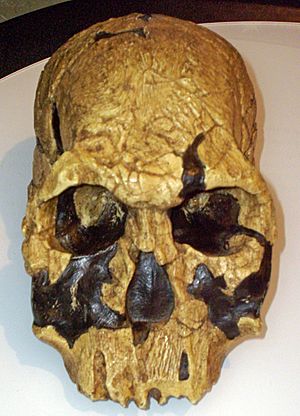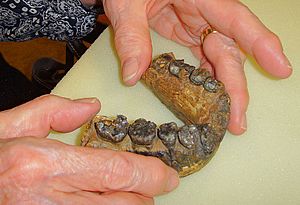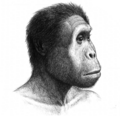Homo rudolfensis facts for kids
Quick facts for kids Homo rudolfensisTemporal range: Pliocene
|
|
|---|---|
 |
|
| Scientific classification | |
| Kingdom: | |
| Phylum: | |
| Class: | |
| Order: | |
| Family: | |
| Genus: | |
| Species: |
H. rudolfensis
|
| Binomial name | |
| †Homo rudolfensis Alexeev, 1986
|
|
Homo rudolfensis is an ancient human species that lived about 1.9 million years ago. It's one of the earliest members of the Homo group, which includes modern humans. Scientists study its fossils to learn more about how early humans evolved and spread across the world.
Contents
Discovering Homo Rudolfensis
This important fossil was found in 1972 by a team led by famous anthropologists Richard Leakey and Meave Leakey. A team member named Bernard Ngeneo made the discovery. They found the fossil at a place called Koobi Fora in Kenya, near a lake that was once called Lake Rudolf (now known as Lake Turkana).
The Famous Skull 1470
The most well-known fossil of Homo rudolfensis is a skull called Skull 1470 (also known as KNM ER 1470). This skull is estimated to be about 1.9 million years old. In 1986, a scientist named V. P. Alexeev gave this species its scientific name, Homo rudolfensis, after the lake where it was found.
What Made Homo Rudolfensis Special?
Scientists believe Homo rudolfensis had a larger braincase compared to some other early human species that lived around the same time. This suggests it might have had a bigger brain. It also had a flatter face and wider cheekbones. These features help scientists understand the differences between early human species and how they might be related to us.
Images for kids
See also
 In Spanish: Homo rudolfensis para niños
In Spanish: Homo rudolfensis para niños
 | Frances Mary Albrier |
 | Whitney Young |
 | Muhammad Ali |







